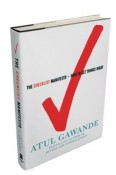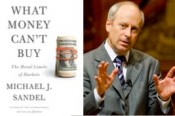Q&A: ATUL GAWANDE – Surgeon / Teacher / Author – The Checklist Manifesto
Written on January 8th, 2015 |
Q&A: Michael Sandel – Moral Limits of Markets
Written on August 20th, 2014 |
Aired 04/29/12
Should we pay children to get good grades? Is it ethical to pay people to test risky new drugs or donate their organs? What about hiring mercenaries to fight our wars, outsourcing inmates to for-profit prisons, auctioning admission to elite universities, or selling citizenship to immigrants able to pay?
Phenomenally popular Harvard professor, Michael Sandel, notes that in recent decades, market values have crowded out non-market norms in almost every aspect of life-medicine, education, government, law, art, sports, even family life and personal relations. He argues that we have drifted from having a market economy to being a market society.
In his new book, What Money Can’t Buy, Sandel asks: Is there something wrong with a world in which everything is for sale? If so, how can we prevent market values from reaching into spheres of life where they don’t belong? What are the moral limits of markets?
